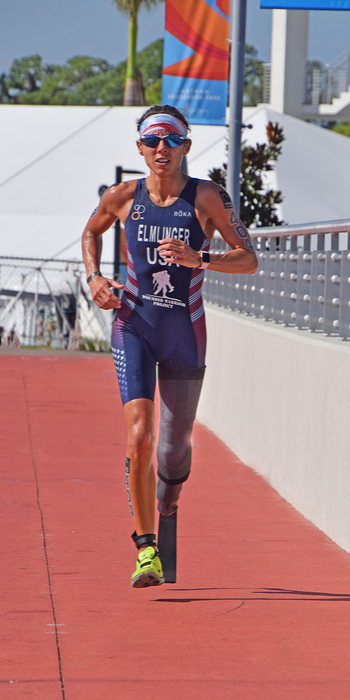From Army Nurse to Paralympic Triathlete



A rare cancer changed Kelly Elmlinger’s role from nurse to patient at Brooke Army Medical Center (BAMC).
Kelly had joined the Army during her sophomore year in college, turning down athletic scholarships because of her strong desire to serve. She became a jumpmaster and was deployed three times as a medic. She was used to flying and driving to crash sites to help evacuate wounded warriors.
After returning stateside, she applied her field experience toward earning an orthopedic nursing degree at the University of North Carolina at Chapel Hill. She graduated in 2010 and got her first choice for work assignment: BAMC.
The Army’s only Level 1 Trauma Center, BAMC in San Antonio houses the Center for the Intrepid, a rehabilitation facility for those recovering from amputations and burns. Kelly wanted to be on the orthopedics floor and take care of wounded warriors who were coming in with multiple wounds. For a year and a half, she used her skills to help others recover from catastrophic injuries.
And then the pain came – and it wouldn’t go away.
“No wonder no one ever saw it.”
Fourteen years of active duty can contribute to wear and tear on the body, so when Kelly’s knee pain persisted through her career, doctors blamed parachuting, running, or a low-key injury from a deployment. There were no abnormal findings on imaging tests, and annual physicals produced the same results.
Still, the pain continued.
During her service at BAMC, she was able to take advantage of more advanced MRI techniques. At first, the MRI revealed a mass of what looked to be a collection of blood vessels. Doctors moved quickly to stop blood flow to the area to keep it from growing.
Kelly’s knee became more painful. The once avid runner could now barely walk. Doctors tried a series of other remedies, including medications, but nothing helped – no one knew yet it was not a benign tumor.

After six weeks, doctors decided to operate and clean it out. It was only when Kelly was on the operating table that the doctors discovered a rare cancer that affects soft tissues that connect, support, and surround bones and organs.
“It was dormant for years,” Kelly recalled. “It was no wonder they missed it, and no wonder no one ever saw it.” Kelly felt sideswiped by a disease that came out of left field. I wanted to come work in San Antonio so badly, and here I was having all these things to offer, and realizing they were meant to help me deal with my own stuff,” Kelly said.
While Kelly’s doctors attempted to save her leg – performing multiple procedures to remove the cancer – Kelly attempted to maintain as regular a lifestyle with her daughter as possible. But a year after her first surgery, life wasn’t getting better. Now Kelly also had to deal with stress fractures from merely walking at a slow pace and the emotional distress from missing out on quality time with her daughter.
It was time to make a tough decision. In October 2017, Kelly had one last surgery – this time to remove her left leg. She immediately started physical rehab in the same hospital unit where her patients received rehab.
“Winning at life”
At the hospital’s rehab facility, Kelly’s respect for her patients only grew.
Fitted with a prosthetic leg, Kelly began training in different adaptive sports. It wasn’t long before she made her way back to her first love in sports – running. Just three weeks after getting a running prosthetic leg, Kelly completed a triathlon in Austin, Texas. She seized the opportunity and qualified for national Paralympic competitions.
At triathlon nationals that June, Kelly won by 12 minutes between her and second place. Being able to compete as a Paralympic athlete at the national level was a double win for Kelly.
“It felt like I’m winning a race, and I’m also winning at life. I have a place here. I had someone tell me, ‘you’ll never run the same again.’ I tucked that away. This feels pretty darn normal.”
She later secured a national-level coach who encouraged her advancement into international competitions. Together they worked to earn a spot on the U.S. National Paralympic Team. She has since retired from the military, made her debut at the International Triathlon Union in Australia, and just recently won gold at the pre-qualifying Paratriathlon World Cup, in Tokyo, Japan.
A Wounded Warrior Project® (WWP) Adaptive Sports program ambassador, Kelly has surpassed expectations and found a new mission life: the 2020 Tokyo Olympics. You can follow Kelly's journey on Twitter and Instagram at @theekellye.
Learn how WWP’s programs help warriors achieve their highest ambition.